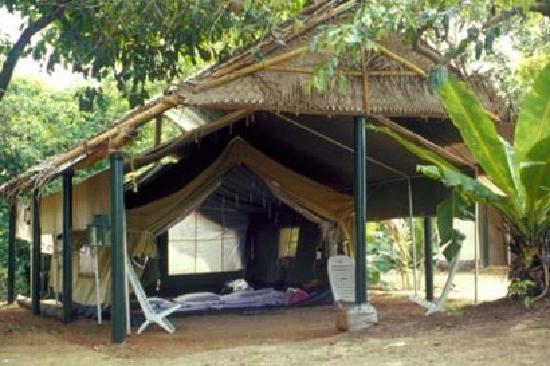Ahh, the Great Outdoors. There’s nothing like camping to get a taste of the wild life. Pitching your tent away from the hustle and bustle of the city life – and the mini version of it that is the Great British Campsite – is an attractive option for many of us, but how to survive a wild camping trip in the rain? Wild camping is great but what about those noises in the night? It’s probably not the Blair Witch or the Headless Horseman but the sound of rain that’s likely to wake you up in terror, if you’ve pitched deep in the woods in some delightful hollow. Here are some tips to find the perfect pitch, despite the British summer.

Babbling Brooks
Small babbling brooks can become raging torrents rather unexpectedly in the type of conditions that we’ve been experiencing this summer. Yes, they provide a handy water source but that source can get out of control. A nice, flat flood plain next to a watercourse is not called a flood plain for nothing. Ideally, don’t pitch camp too close to a river, brook, stream or beck or their associated over-spills. The edge of the flood plain, whatever its size, is probably safer. A slope can be a good place to pitch, if it’s not too steep, so if the worst happens any water will pass through the tent.
Jolly Japes and Steamy Tents
In wet weather conditions the tent will need to be as dry inside as possible. The basic rules apply: don’t let things touch the tent material, ensure the correct separation between inner and outer sheets is maintained and, importantly, keep the tent well ventilated. Laughter and jolly japes in the evening will cause plenty of condensation, which will only get things steamy, in a bad way. Even if it’s raining cats and dogs outside, ensure ventilation flaps are open.
Cordon Bleu?
Cookery skills; nobody looks good (or feels good) cooking breakfast stood outside in the rain dressed sadly in their waterproofs. Try to use a tent with an adequate porch area in which you can cook safely. Check the tents manufacturer’s instructions and, if necessary, have the stove outside, but keep yourself sheltered in the entry. Plan ahead the night before, and have everything you’ll need to cook breakfast to hand. Alternatively set up a separate tarpaulin as a cooking area, if you intend to prepare a three course, full English.
The Call of the Wild (and other nocturnal noises)
There’s nothing quite so disheartening, as lying there listening to the call of the wild (the sound of the rain pouring down) and experiencing a call of nature. This is a matter that is entirely up to you, but there are bottles with special attachments for both ladies and gentlemen that you can acquire. It may not be dignified, but the choice is yours; damp and dignified, dry and un-dignified. Besides, who’s going to know?
If you’re wild camping tents should be lightweight but with adequate space. Keep a dry area in the tent and also ensure it’s well ventilated. Avoid the edges of attractive babbling brooks, which can become deeply unattractive very suddenly and plan carefully for calls of nature that call in the night!

